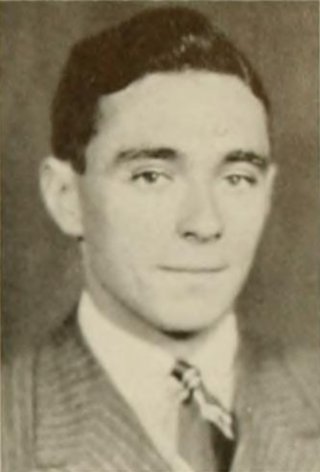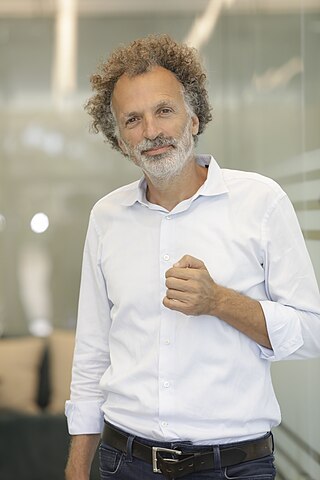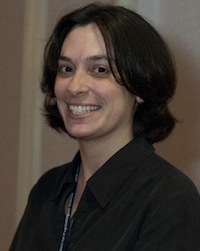Related Research Articles

Jerome Seymour Bruner was an American psychologist who made significant contributions to human cognitive psychology and cognitive learning theory in educational psychology. Bruner was a senior research fellow at the New York University School of Law. He received a BA in 1937 from Duke University and a PhD from Harvard University in 1941. He taught and did research at Harvard University, the University of Oxford, and New York University. A Review of General Psychology survey, published in 2002, ranked Bruner as the 28th most cited psychologist of the 20th century.
Rapid serial visual presentation (RSVP) is a scientific method for studying the timing of vision. In RSVP, a sequence of stimuli are shown to an observer at one location in their visual field. The observer is instructed to report one of these stimuli - the target - which has a feature that differentiates it from the rest of the stream. For instance, observers may see a sequence of stimuli consisting of grey letters with the exception of one red letter. They are told to report the red letter. People make errors in this task in the form of reports of stimuli that occurred before or after the target. The position in time of the letter they report, relative to the target, is an estimate of the timing of visual selection on that trial.
Linda B. Smith is an American developmental psychologist internationally recognized for her theoretical and empirical contributions to developmental psychology and cognitive science, proposing, through theoretical and empirical studies, a new way of understanding developmental processes. Smith's works are groundbreaking and illuminating for the field of perception, action, language, and categorization, showing the unique flexibility found in human behavior. She has shown how perception and action are ways of obtaining knowledge for cognitive development and word learning.

Nancy Gail Kanwisher FBA is the Walter A Rosenblith Professor of Cognitive Neuroscience in the Department of Brain and Cognitive Sciences at the Massachusetts Institute of Technology and an investigator at the McGovern Institute for Brain Research. She studies the neural and cognitive mechanisms underlying human visual perception and cognition.

Michael I. Posner is an American psychologist who is a researcher in the field of attention, and the editor of numerous cognitive and neuroscience compilations. He is emeritus professor of psychology at the University of Oregon, and an adjunct professor at the Weill Medical College in New York. A Review of General Psychology survey, published in 2002, ranked Posner as the 56th most cited psychologist of the 20th century.
Judith F. Kroll is a Distinguished Professor of Language Science at University of California, Irvine. She specializes in psycholinguistics, focusing on second language acquisition and bilingual language processing. With Randi Martin and Suparna Rajaram, Kroll co-founded the organization Women in Cognitive Science in 2001. She is a Fellow of the American Association for the Advancement of Science (AAAS), the American Psychological Association (APA), the Psychonomic Society, the Society of Experimental Psychologists, and the Association for Psychological Science (APS).
Marlene Behrmann is a Professor in the Department of Ophthalmology at the University of Pittsburgh. She was previously a Professor of Psychology at Carnegie Mellon University. She specializes in the cognitive neuroscience of visual perception, with a specific focus on object recognition.
Susan E. Carey is an American psychologist who is a Professor of Psychology at Harvard University. She studies language acquisition, children's development of concepts, conceptual changes over time, and the importance of executive functions. She has conducted experiments on infants, toddlers, adults, and non-human primates. Her books include Conceptual Change in Childhood (1985) and The Origin of Concepts (2009).

Helen J. Neville was a Canadian psychologist and neuroscientist known internationally for her research in the field of human brain development.
Barbara Tversky is an American psychologist. She is a professor emerita of psychology at Stanford University and a professor of psychology and education at Teachers College, Columbia University. Tversky specializes in cognitive psychology.

Moshe Bar is an Israeli cognitive neuroscientist. He is a professor at Bar-Ilan University. He was previously head of the Gonda Multidisciplinary Brain Research Center at Bar-Ilan University and before that director of the Cognitive Neuroscience Laboratory at Harvard Medical School and Massachusetts General Hospital.
Isabel Gauthier is a cognitive neuroscientist, and the David K. Wilson Professor of Psychology and head of the Object Perception Lab at Vanderbilt University’s Department of Psychology. In 2000, with the support of the James S. McDonnell Foundation, she founded the Perceptual Expertise Network (PEN), which now comprises over ten labs based across North America. In 2006 PEN became part of the NSF-funded Temporal Dynamics of Learning Center (TDLC).
Glyn W. Humphreys was a British cognitive neuropsychologist and academic. He was the Watts Professor of Experimental Psychology and principal investigator for the CNN Lab at Oxford University. He had previously worked at the University of Birmingham in the School of Psychology, where he held an honorary professorship of Cognitive Psychology. He died on 14 January 2016.
Laura E. Schulz is a professor of cognitive science at the brain and cognitive sciences department of the Massachusetts Institute of Technology. She is the principal investigator of the Early Childhood Cognition Lab at MIT. Schulz is known for her work on the early childhood development of cognition, causal inference, discovery, and learning.

Nilli Lavie, FBA, is an academic, psychologist, and neuroscientist with British-Israeli dual nationality.

Sharon Thompson-Schill is the Christopher H. Browne Distinguished Professor of Psychology at the University of Pennsylvania in Philadelphia, Pennsylvania. Her research covers the field of biological basis of human cognitive systems, including language, memory, perception, and cognitive control, and the relationships between these systems. As of 2023, she has produced more than 190 scientific publications, which collectively have been cited over 18,000 times.
Edward Howard Adelson is an American neuroscientist who is currently the John and Dorothy Wilson Professor of Vision Science at Massachusetts Institute of Technology and an Elected Fellow of the National Academy of Sciences and American Academy of Arts and Sciences.
Emily E. Balcetis is an American social psychologist and Associate Professor of Psychology at New York University. Her research focuses on people's perception of world and how their motivations, goals, and emotions influence it, especially with regards to visual perception.
Aude Oliva is a French professor of computer vision, neuroscience, and human-computer interaction at the MIT Computer Science and Artificial Intelligence Laboratory (CSAIL).
Naomi Weisstein was an American cognitive psychologist, neuroscientist, author and professor of psychology. Weisstein's main area of work was based in social psychology and cognitive neuroscience. She considered herself a radical feminist and used comedy and rock music as a way to disseminate her views and ideologies: Weisstein was an active member in founding the Chicago Women's Liberation Union, which promoted feminist activities and improved women's way of life. She received a Bachelor of Arts from Wellesley College in 1961. She then went on to complete her PhD at Harvard University in 1964. After her PhD, she finished her post-doctoral fellowship at the University of Chicago. Furthermore, she was a member of the American Association for the Advancement of Science and the American Psychological Society.
References
- ↑ "Fellows". The Society of Experimental Psychologists. Archived from the original on 14 June 2013. Retrieved 8 March 2018.
- ↑ "Fellows". Cognitive Science Society. Archived from the original on 26 September 2018. Retrieved 8 March 2018.
- ↑ "APS Fellows". Association for Psychological Science. Archived from the original on 13 August 2020. Retrieved 8 March 2018.
- 1 2 3 "NSF GRFP Recipient Mary C. Potter" (PDF). NSF.
- 1 2 3 "Potter, Mary Ph.D. Professor of Psychology, Emerita Brain & Cognitive Sciences". Brain & Cognitive Sciences. Retrieved 11 December 2020.
- 1 2 3 Fang, Emily (August 2014). "Molly Potter". Woods Hole Museum.
- ↑ Zernike, Kate (2023). The Exceptions: Nancy Hopkins, MIT, and the Fight for Women in Science. New York, NY: Scribner. ISBN 978-1-9821-3183-8.
- ↑ "Recent Awardees and Citations". The Society of Experimental Psychologists. Archived from the original on 2015-05-12. Retrieved 2018-03-08.